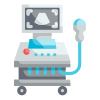Fill out form to enquire now
MRI Screening Bilateral Hands
Medintu has collaborated with the best pathology laboratories that are NABL and NABH certified and follow ISO safety guidelines to provide the best MRI Screening Of Bilateral Hands at an affordable price for needy individuals. Magnetic Resonance Imaging (MRI) is a destructive, noninvasive method of diagnosis that employs magnetic areas and radio waves to fashion a picture of the body. It is especially useful in the assessment of disorders relating to the muscles, bones and joints. In case of the bilateral hands, MRI is especially useful in identifying many different diseases that may affect both hands at the same time.Hand pain, particularly when it occurs along with weakness and swelling, maybe attributed to arthritis, tendon injuries, nerve compression, or fractures, and MRI provides a method to view these conditions in detail.
Compared to conventional radiography, MRI offers the examination of both soft tissues (muscle, ligaments, tendons, nerve) and osseous structures; hence MRI is invaluable in evaluating complex hand pathologies. MRI screening of both hands is especially beneficial for the condition involving both sides, such as a repetitive stress injury, a rheumatoid arthritis problem, or carpal tunnel syndrome . This imaging facilitates understanding of the crucial origin of symptoms and, thus, improves treatment approaches. To schedule an appointment for MRI Screening Of Bilateral Hands, simply contact Medintu or call our customer care at +919100907036 or +919100907622 for more details and queries.
What is MRI Screening of Bilateral Hands?
MRI screening of bilateral hands is a technique of screening a region within the body to create an image of the bodily structure and is considered a screening if the radiologist focuses on the bilateral hands only as the structures within them are examined by the use of a strong magnetic field and radio waves. This non-invasive modality enables visualization of soft tissues, bones, tendons, muscles, ligaments, nerves, and blood vessels of the hands in high detail that is very essential in the diagnosis of different diseases Of a different nature from ordinary X-rays, most of which are for assessing bone abnormalities, MRI offers full visualization of bones and soft tissues. This makes it particularly useful in assessment of bilateral conditions affecting the hands including; musculoskeletal injuries, degenerative diseases, nerve disorders and inflammatory conditions.
Key Aspects of MRI Screening of Bilateral Hands:
- Non-invasive and Radiation-Free: MRI it is safer than X-ray in that it uses no ionizing radiation hence preferable for repeated imaging and for patients with certain conditions.
- Detailed Imaging: MRI is superior to other imaging methods as it presents detailed images of both the muscles, tendons, and ligaments and the bones.
- Bilateral Focus: Large scale use is useful for conditions that affect both hands, whether it is symptoms or signs including pain, numbness, and swelling.
Indications for MRI Screening of Bilateral Hands
Bilateral hands MRI scanning is usually advised in patients showing symptoms and conditions for both hands at the same time. It is mostly useful in the diagnosis of musculoskeletal, neurological, as well as vascular diseases. Among the most common indications of MRI scanning of bilateral hands are discussed below;
- Chronic Pain or Swelling
Arthritis: Chronic pain, swelling, and stiffness in both hands may be due to osteoarthritis, rheumatoid arthritis, or other inflammatory joint disorders. MRI is useful in the evaluation of joint damage, inflammation, and cartilage wear.
Tendinitis and Tenosynovitis: Pain and swelling in tendons, especially in the wrists or fingers, which persists over time, may be due to tendonitis or tenosynovitis, which is inflammation of the tendon sheaths.
- Repetitive Strain Injuries
Carpal Tunnel Syndrome: those who are employed in repetitive jobs, like data entry or assembly line get tingling and numbness or weakness of hands due to carpal tunnel syndrome; MRI scans examine the median nerve and surrounding structures to check for compression or injury.
Repetitive Stress Injuries: Both hands suffer from overuse or repetitive motion on tendons, ligaments, or bones. MRI can identify tears, strains, or inflammation caused by repetitive motion.
- Compression or Neurological Symptoms from a Nerve
Paresthesia: Any repetitive paresthesias of the hands, as for carpal tunnel syndrome or other neurological conditions, would suggest a diagnosis of nerve compression.
Peripheral Neuropathy: Patients suspected to have peripheral nerve damage of their hands because of diabetes or other vitamin deficiencies may present with pain, weakness, or changes in sensation; the diagnosis of MRI may be considered.
- Suspected Trauma or Injury
Fractures and Dislocations: A view at MRI is much better than that by X-ray in case of both hands being suspected to have fractures or dislocations if there are soft tissue injuries, or stress fractures undetected by conventional images.
Ligament or Tendon Injuries: Even tears to ligaments or tendons from both hands can experience traumatic injury like sprains or ruptures; finding the extent of the damage will be eased with the aid of an MRI.
- Soft Tissue Masses or Lesions
Ganglion Cysts Fluid-filled cysts which present in the hand joints or tendons may be painful and swollen and sometimes stiff. MRI defines their location and size.
Benign or Malignant Tumors MRI can identify soft tissue or bone tumors of the hand, benign like lipomas, or malignant like sarcomas.
Benefits of MRI Screening for Bilateral Hands
MRI scanning has found many advantages in the bilateral hands. These benefits are more relevant in diagnosing and evaluating conditions that appear bilaterally. Some of these benefits for using MRI in the bilateral hand scan are:
- Non-Invasive and Radiation-Free
No radiation exposure: MRI does not use ionizing radiation like X-rays or CT scans. This makes it safer in repeated scanning or for those patients who need frequent monitoring.
Non-Invasive: MRI does not include any surgical cuts or inserting instruments inside the body. It is, hence painless and comfortable.
- High Resolution Imaging of Soft Tissues
MRI gives a detailed picture of the soft tissues, which include muscles, tendons, ligaments, nerves, and cartilage. This comes in very handy with conditions that are very hard to appear on an X-ray, like tendonitis, ligament tears, carpal tunnel syndrome, or nerve impingements.
Clear Visualization of Joint Structures: MRI offers clearer images of the soft tissues, such as cartilage, in the wrists and fingers, which aids in assessment of conditions such as osteoarthritis or rheumatoid arthritis, which primarily involve the soft tissue and cartilage in the joints.
- Conditions at Early Stages
Detects Subtle Changes: MRI can detect early signs of conditions that may not be visible on traditional X-rays, such as soft tissue damage, early stages of arthritis, or the presence of small tumors or cysts.
Identifies Early Inflammation: MRI can highlight inflammation in soft tissues and joints, which can be critical for early diagnosis of inflammatory diseases like rheumatoid arthritis, gout, or tenosynovitis.
- Comprehensive Diagnosis
Ability to view both hands at one time: With MRI, one can view both hands simultaneously. This is very useful for examining an condition which comes in bilaterally, meaning it’s a process or state that affects both sides of the body, such as bilateral arthritis, carpal tunnel syndrome, or repetitive stress injuries.
Bone and Soft Tissue Imaging: MRI clearly images all the bone structures, as well as the soft tissues, and gives an overall panoramic view of the hand. This facilitates the diagnosis of fracture, ligament injury, tendinitis, tear of muscles, and various joint disorders in a sitting.
- Accurate diagnosis of nerve conditions
Nerve Compression Diagnosis: MRI is excellent for making a diagnosis in conditions that may present with numbness, tingling, and weakness related to nerve compression, such as carpal tunnel syndrome. It can detail where and how much of the nerve is involved.
Peripheral Neuropathy: In disease processes such as diabetes and vitamin deficiencies that affect both hands’ peripheral nerves, MRI can help define how much nerve damage or inflammation.
- Test Type: MRI Screening Bilateral Hands
- Preparation:
- Wear a loose-fitting cloth
- Fasting not required
- Carry Your ID Proof
- Prescription is mandatory for patients with a doctor’s sign, stamp, with DMC/HMC number; as per PC-PNDT Act
- Reports Time: With in 4-6 hours
- Test Price: Rs.4000
How to book an appointment for a MRI Screening Of Bilateral Hands?
To schedule an appointment for MRI Screening Of Bilateral Hands, simply contact Medintu or call our customer care at +919100907036 or +919100907622 for more details and queries.
Is MRI scanning of both hands painful?
No, MRI scanning is typically painless. The process is non-invasive and only requires you to hold a steady position during the scan. Some patients may experience discomfort from lying in one position for a period, but this has nothing to do with the pain from the MRI itself.
How long does my bilateral hands MRI take?
The procedure of an MRI scan usually lasts between 30 and 60 minutes, depending on the complexity of the scan and the specific conditions that are being examined. You will need to hold your hands still for long periods of time during the scan, but you will not require a long recovery period after the scan.
Do I need to prepare for an MRI of the bilateral hands?
Preparation is minimal. You may be asked to remove any metal objects before the procedure, such as jewelry, watches, or hairpins. You are also advised to inform your healthcare provider of any implants, for example, a pacemaker or metal plates or other medical conditions that would likely influence an MRI scan.
Is MRI screening safe?
Yes, MRI is safe for most people. It does not employ ionizing radiation; hence, it is safer than X-rays or CT scans. However, patients with certain metal implants, pacemakers, or other contraindications cannot undergo MRI. Always tell your doctor about any medical implants or devices before the procedure.
Will contrast be used during the MRI of my hands?
In most cases, contrast is not necessary for an MRI of the hands. However, if the doctor wants to make the images clearer in order to evaluate certain conditions, such as inflammation, nerve problems, or tumors, a contrast agent will be used. The contrast is usually injected intravenously before the scan.
How do I get my MRI results?
Once the MRI scanning is done, the images will be processed by a radiologist, then a detailed report will be given to your doctor. You normally expect to get your test results within a few days, and your doctor is going to explain to you what was found and what’s expected next in your treatment or diagnostic process.
Can all types of hand conditions be detected by MRI?
MRI is very sensitive and can diagnose a wide spectrum of hand conditions, including soft tissue injuries, bone fractures, arthritis, tendonitis, nerve compression, and tumor. However, some pathology may need additional imaging modalities such as X-rays or CT scans to achieve full diagnosis.
Do I need to be screened for bilateral hands when I only have symptoms in one hand?
While MRI may be valuable in diagnosing conditions involving one hand, screening of both hands at the same time would be in order if a patient comes with symptoms which could both involve the two hands or if the condition is similar to carpal tunnel syndrome, arthritis, or repetitive strain injuries. This helps recognize the underlying issues that may be influencing both sides.
Why Choose Medintu for MRI Screening Bilateral Hands?
Medintu is an online medical consultant, which offers home services not only in your city but also in all major cities of India, such as Hyderabad, Chennai, Mumbai, Kolkata and others. This makes it easy for us to work with diagnostic centers that boast of having the most accurate equipment. The customer service for booking the appointment of the services is available 24/7 and Medintu also comes with instructions. Medintu has not only the best diagnostic centres, but it offers them at very cheaper prices. If you have been tested, you can promptly schedule an appointment with a health care service through our list of skilled physicians. For appointment for MRI Screening Of Bilateral Hands, you can chat with us through Medintu or call our customer care at 919100907036 or 919100907622 for more information or inquiries.





